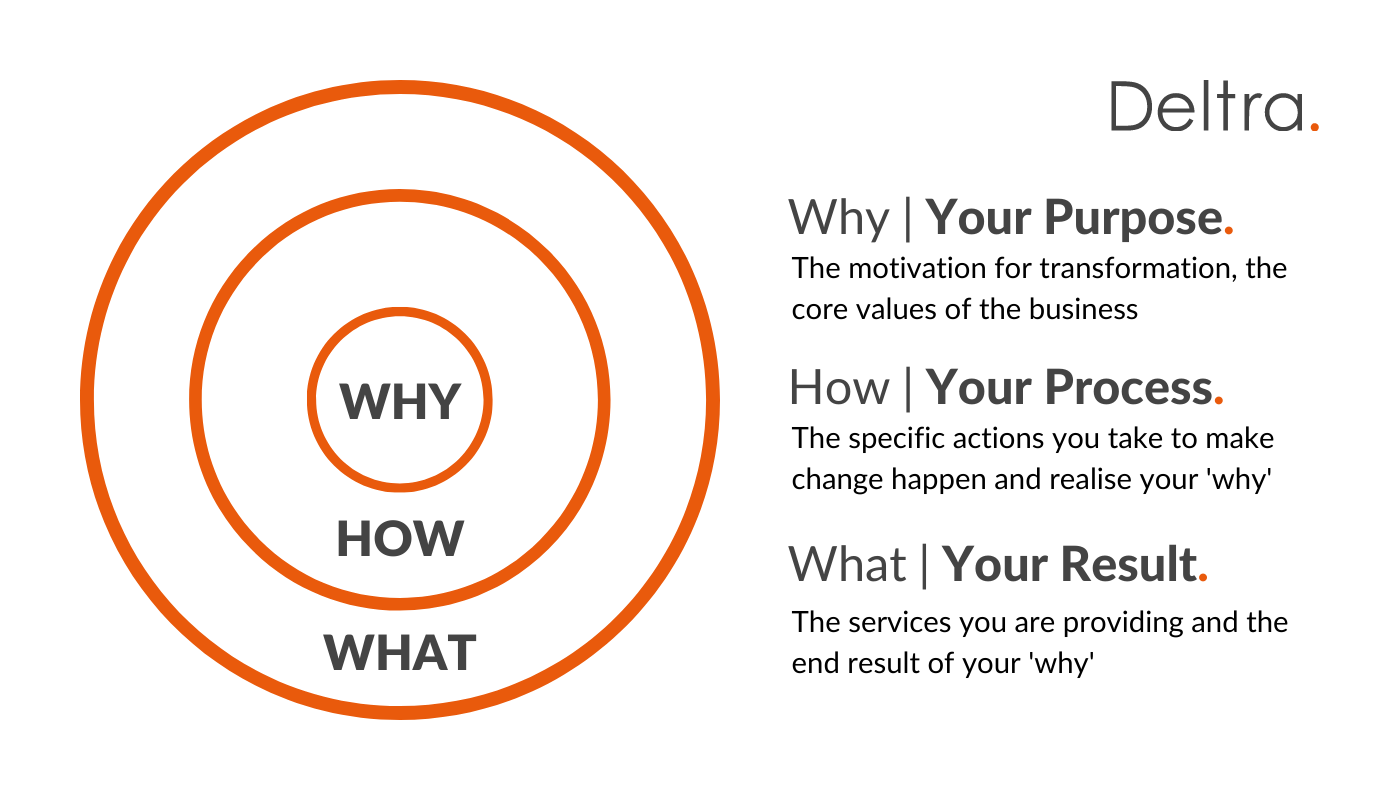Webinar Roundup: Leading Through Change with Nigel Field
Business transformation professionals know how to make change happen, map out strategies and keep to deadlines, but is that enough? One often undervalued aspect of the role is leadership.
In our latest digital roundtable event on the 24th of March, we were joined by Nigel Field, who has a long history of driving innovation in telecoms and leading transformation programmes worldwide. From working with Three UK during the original iPhone launch, to running multinational programmes with CK Hutchison in Hong Kong and helping Vodafone set up business in the Middle East.
Nigel gave an enlightening presentation, talking us through why he prioritises supporting his team members through change, how a more empathetic leadership style can have greater success, and what steps can be taken to facilitate an open environment.
Communicate the why
This may sound odd if you aren’t familiar with Simon Sinek’s ‘Golden Circle’. The basis of this mode of thinking is that businesses and people should have a core belief (a ‘why’) that guides them in all decisions they make. Some of the most popular businesses like Apple or Nike define a strong ‘why’ and this is what customers buy into, not just the fact that they make computers and shoes. How does this play into transformation? Employees can often dig their heels in and be resistant to change for a multitude of reasons. Communicating the ‘why’ of your programme can alleviate this by giving them something to rally around. Highlight why the end goal is worth the struggle. It isn’t always going to be easy – transformation can often mean you have to make some hard decisions – but aligning everyone to a shared outcome can bring employees together and give them a reason to be invested in the programme.
How does this play into transformation? Employees can often dig their heels in and be resistant to change for a multitude of reasons. Communicating the ‘why’ of your programme can alleviate this by giving them something to rally around. Highlight why the end goal is worth the struggle. It isn’t always going to be easy – transformation can often mean you have to make some hard decisions – but aligning everyone to a shared outcome can bring employees together and give them a reason to be invested in the programme.
Simply by using more collaborative language like asking “how can we work together” can avoid the ‘us and them’ mentality. Either way, the programme is moving forward, and it is in everyone’s best interest for there to minimal resistance. It is the job of a change professional to facilitate this through strong leadership.
Invite input
Don’t fall into the trap of thinking you know everything. You probably don’t. This is even true of managers and leaders, especially in transformation. It can be beneficial to be laser-focused on your objectives and deadlines at times, but there are people around you that deal with these issues on a daily basis. Team members are a valuable source of insight that you likely don’t have. Nigel recommends taking time to genuinely consult with colleagues, try and understand where they are coming from, and be open to taking their suggestions on board. This doesn’t mean you have to accept everything but be genuine in listening to them and you may be surprised what you learn. In the past, Nigel has accepted up to half of the proposals from his team members. Not only does this build trust between you and the affected teams, but you could find a solution that works better for you, the business and your team members.
Team members are a valuable source of insight that you likely don’t have. Nigel recommends taking time to genuinely consult with colleagues, try and understand where they are coming from, and be open to taking their suggestions on board. This doesn’t mean you have to accept everything but be genuine in listening to them and you may be surprised what you learn. In the past, Nigel has accepted up to half of the proposals from his team members. Not only does this build trust between you and the affected teams, but you could find a solution that works better for you, the business and your team members.
Be visible and available
It is tempting to view and manage transformation from a detached point of view; however, transformation doesn’t take place in a vacuum. At the end of the day, it affects real people – their social lives, income, mental health and more. Nigel remembered seeing leadership teams hide themselves away, avoiding interaction with employees to create emotional distance.
Understandably, it can be uncomfortable to witness the negative impact that your change for the business has on individuals. However, leading with this attitude feeds into the ‘us and them’ dynamic and will typically make your job harder, creating further resistance and slowing down the transformation. This boils down to one key message – take ownership. Welcome the uncomfortable conversations and listen to concerns and feedback. Yes, you’re busy, but take the time to hold employee meetings and one-to-ones and people will respect you more for it.
This boils down to one key message – take ownership. Welcome the uncomfortable conversations and listen to concerns and feedback. Yes, you’re busy, but take the time to hold employee meetings and one-to-ones and people will respect you more for it.
Recognise individuals
A one-to-one with someone facing redundancy sounds like a scary idea. You might get shouted at, they may even cry, you feel bad, you don’t want to face it – but what if they surprised you? Nigel called to mind times when he had gone through this exact thought process. In one case, the employee that he thought would be devastated by news of their redundancy was actually delighted, feeling that their time at the company had come to a natural end and it was time to move on.
In the session, Nigel challenged us to drop our preconceived notions of how we think people will react. By putting walls up and assuming the worst, you could be making your job harder than it needs to be. Recognising that everyone is different and engaging in open conversation gives people the chance to subvert your expectations.
Be committed
Things don’t always go to plan in business transformation. It’s useful to take a step back and regain context so that you don’t get lost in the details. Use your ’why’ to find your way out of the forest and back to the path. The pandemic is a perfect example of this. Nigel’s current role with Vodafone is completely remote, meaning he has never met his team and doesn’t have those everyday moments that build rapport and trust. But, through coming back to his ‘why’, Nigel makes sure to put effort into building these relationships, remarking that his team have noticed and appreciate it.
Don’t think that the above points mean you should roll over and give up on your targets – that is not the case. Instead, Nigel suggests that your ‘why’ should be your guiding star and set framework of non-negotiable points. This allows you to welcome conversation on the finer details like the process or experience of the change without compromising on your overall vision for the programme. Try implementing some of these teachings into your current or next transformation programme to see if you could benefit from Nigel’s expertise.
We hold insightful events such as this regularly. If you would like to attend future webinars, sign up on our Networking Events page.
9th April
Events
Related insight
Related News
Looking to
transform?
Quicklinks

Address
Deltra Group
52-54 Gracechurch St
London
EC3V 0EH
Contact
+44 (0)207 375 9500
info@deltragroup.com



